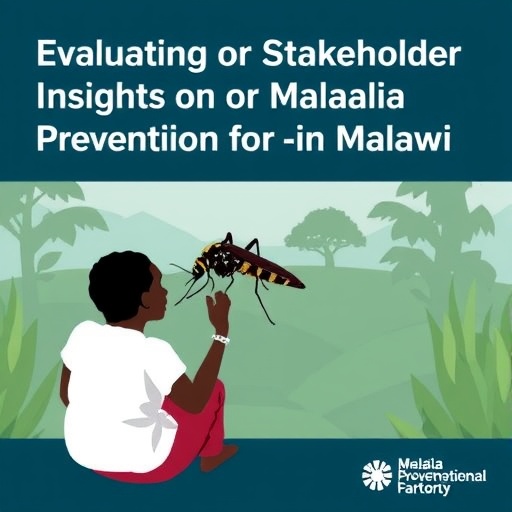In a groundbreaking study led by researchers Ndambo, Hoyt, and Nyirongo, the perceptions of various stakeholders regarding the implementation of post-discharge malaria chemoprevention in children with severe anemia in Malawi have been meticulously evaluated. This research dives deep into the intricacies of malaria prevention methods and challenges that remain prevalent in this African nation, particularly affecting its most vulnerable population—young children suffering from severe anemia.
Malawi, a country grappling with high malaria incidence, is at the forefront of implementing innovative healthcare strategies to mitigate the risk of this deadly disease. The study emphasizes the pressing need for effective malaria chemoprevention, particularly for children who have been hospitalized for severe anemia. The researchers recognize that while medical treatment is crucial, understanding the perspectives of those involved in the healthcare continuum is equally important. Stakeholders encompass healthcare providers, hospital administrators, policymakers, and families directly affected by the health crisis.
Post-discharge, many families face the dual challenges of managing their child’s recovery from anemia while also ensuring they are not reinfected with malaria. The integration of malaria chemoprevention into standard post-discharge care represents a proactive approach to health management. This study translates the necessity of this integration into the lived realities of parents and caregivers, who are frequently caught in a web of logistical and socio-economic challenges when seeking to maintain their child’s health after hospitalization.
The study sheds light on the varied perceptions of stakeholders. Healthcare providers exhibit differing opinions on the effectiveness of malaria chemoprevention, with some emphasizing the necessity due to the high transmission rates in endemic regions. Others express concerns regarding the practicality of implementing such strategies in resource-constrained settings. This divergence stems from a lack of comprehensive training and resources, which poses questions about the scalability of malaria chemoprevention programs.
Evaluating the contextual factors that influence these perceptions is vital. The researchers conducted interviews and focus groups, leading to rich qualitative data that surfaced the unique barriers and facilitators within the Malawian healthcare system. Cooperation and communication among stakeholders emerged as central themes, with variations in understanding concerning the urgency of malaria prevention efforts significantly affecting program endorsement. This finding highlights the necessity for greater education and training directed at healthcare providers, aiming to cultivate a unified approach towards malaria management.
Additionally, the socio-cultural nuances surrounding healthcare practices in Malawi play a crucial role in the effectiveness of malaria chemoprevention strategies. Families are often embedded in cultural beliefs and traditional practices that can either support or hinder engagement with modern medical interventions. The research illustrates that enhancing community awareness is pivotal for fostering acceptance of malaria prevention methods, emphasizing that educational campaigns must be culturally sensitive and linguistically appropriate.
A pivotal aspect of this study is the analysis of resources—both financial and logistical—available to implement post-discharge malaria chemoprevention. Investigating the funding landscapes often reveals that allocation is inconsistent and frequently insufficient. Policymakers must be informed about the urgent need for increased investment into healthcare frameworks that address not just acute needs, but also preventive measures that could save lives.
Through this multifaceted lens, the study demonstrates that successful implementation of malaria chemoprevention hinges on comprehensive stakeholder engagement. It is imperative that the voices of families, particularly those directly affected by malaria and anemia, are amplified in the decision-making processes. Their lived experiences provide invaluable insights into how healthcare provisions can best align with community needs.
The findings of this significant analysis are crucial in shaping future health policy in Malawi. By addressing the clear gaps in knowledge and practice, the research sets the stage for more effective malaria prevention strategies tailored for children. Moreover, the lessons learned here have broader implications, potentially informing similar interventions in other malaria-endemic regions across Africa.
Ultimately, the research serves as a powerful reminder of the importance of integrating contextual understanding into health interventions. By focusing on stakeholder perceptions and systematically addressing the barriers faced by families, healthcare providers can foster more effective partnerships, ensuring that preventive measures are not only implemented but are also sustainable in the long run.
As the fight against malaria continues to evolve, studies like this one underscore the necessity of a holistic approach. This approach must embrace the complexity of human factors alongside medical innovation, paving the way for healthier futures for children in Malawi and beyond.
Subject of Research: Stakeholder perceptions and contextual factors in implementing post-discharge malaria chemoprevention in children with severe anemia in Malawi.
Article Title: Assessing stakeholder perceptions and contextual factors in implementing post-discharge malaria chemoprevention in children with severe anaemia in Malawi.
Article References: Ndambo, M.K., Hoyt, J., Nyirongo, E. et al. Assessing stakeholder perceptions and contextual factors in implementing post-discharge malaria chemoprevention in children with severe anaemia in Malawi. BMC Health Serv Res 25, 1409 (2025). https://doi.org/10.1186/s12913-025-13577-w
Image Credits: AI Generated
DOI:
Keywords: malaria prevention, severe anemia, Malawi, stakeholder perceptions, healthcare policy, chemoprevention, healthcare strategies, community engagement.
Tags: children’s health and disease managementhealthcare challenges in Malawihealthcare policy and malaria preventionimportance of family involvement in healthinnovative healthcare strategies in Africaintegrating chemoprevention in healthcaremalaria incidence in African nationsMalaria prevention strategies in Malawiperspectives of healthcare providerspost-discharge care for childrensevere anemia in childrenstakeholder perceptions on malaria chemoprevention





